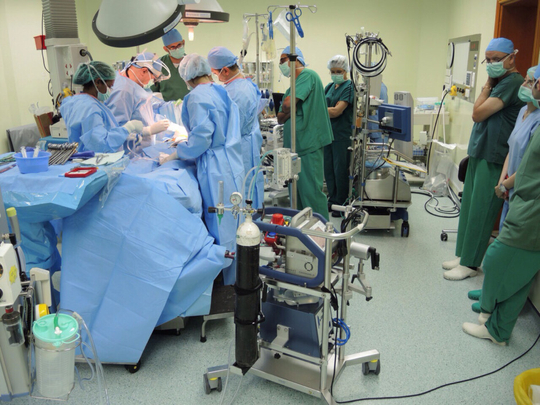
Sharjah: In a landmark surgery, doctors in Sharjah have implanted a HeartWare Ventricular Assist System (VAS) or ‘artificial heart’ to save the life of a young Emirati.
The 21-year-old male patient is awake and responding well following Monday’s ground-breaking operation at the Al Qasimi Hospital in Sharjah, it was announced yesterday.
The details of the surgery were revealed by Dr Yousuf Al Serkal, assistant undersecretary for hospitals sector, Dr Arif Al Nooryani, executive director and consultant cardiologist at Al Qasimi Hospital, Dr Mohammad Abdul Aziz, consultant cardiologist at Al Qasimi Hospital and Kalthoum Al Beloushi, director of hospitals administration at Ministry of Health, in a press conference here yesterday.
Dr Al Serkal said: “We are delighted with this first implant where surgeons in Al Qasimi Hospital have implanted the first artificial heart successfully.”
He added that the Ministry of Health would soon open a centre for organ transplant in the UAE.
Abdul Rahman Bin Mohammad Al Owais, Minister of Health, commended the team’s efforts and thanked His Highness Shaikh Mohammad Bin Rashid Al Maktoum, Vice-President and Prime Minister of the UAE and Ruler of Dubai, for his inspiring vision and continuous support.
“Completing the first artificial heart surgery in the UAE and most importantly saving a young emirati’s life is a great success. We were able to accomplish this because of Shaikh Mohammad,” he said.
Dr Abdul Aziz said the implant will give patients a normal social life with least dependence on medication. “We’ve already seen these types of devices, but they had a relatively low autonomy. This ‘heart’ will allow for more movement and less clotting.”
Major achievement
Dr Nooryani told Gulf News: “It shows we are pioneers in health care, that we can invent, that we can carry an innovation that will also bring hope to people.”
Meanwhile, the patient, who is a student at the University of Sharjah, is said to be awake and responding well following the operation on Monday. He is expected to make a full recovery. The operation, which lasted five hours, cost around Dh1 million but will be done free for citizens.
Dr Al Nooryani said the patient suffered from heart problems since he was six months old. He was transferred to Al Qasimi Hospital on June 11 due to severe weakness in the heart muscle, as well as kidney and liver failure. The patient was bedridden in a Rasl Khaimah hospital for the past three weeks.
“The only choice for us was to carry out this surgery to save his life. otherwise, he would have died,” the doctor said. “We discussed the issue with the Minister of Health who responded immediately to the issue and we imported the device from Germany,” Dr Al Nooryani said, adding, “We have ordered three more devices.”
The device mimics heart muscle contractions and contains sensors that adapt blood flow to the patient’s movement. The artificial heart is powered by external, wearable lithium-ion batteries. Inside the heart, surfaces that come into contact with blood are made partly from bovine tissue instead of synthetic material such as plastic that can cause blood clots.
For those suffering from the most severe form of heart failure, a transplant is the only option. But only around 4,000 hearts are available around the world each year, compared to around 100,000 people on the transplant list. Research into artificial hearts began in the US in 1963.












